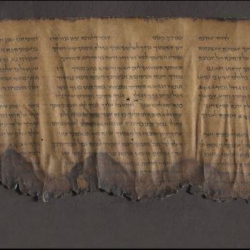As we prepare to observe Tishah b’Av and commemorate the destruction of Jerusalem that led to the exile of the Jewish people for centuries to come, we are acutely aware that we find ourselves in the midst of the worst refugee crisis in recorded history, with more than 68 million people displaced worldwide. Given these extraordinary numbers, the continued attacks on asylum and the refugee resettlement program in the United States over the last eighteen months are even more inhumane.
Of course, we know that the proverbial 10th of Av will come, and we will rise up from our mourning with renewed resolve to support refugees and asylum seekers. First, though, we take time to dwell fully in the mourning demanded by the 9th of Av. We fervently lament the many cruel actions this administration has taken to limit the ability of refugees and asylum seekers to seek safety in our country, and we mourn for lives destroyed and lives lost.
How To Use This Text
If you know Eicha trōp*, record a video of yourself dressed in black and seated on the floor (as is customary on Tishah b’Av), chanting the text below. If you do not know trōp, simply read the text. Post the video to Facebook, Twitter, and Instagram with a message about why you are choosing to include refugees and asylum seekers in your Tishah b’Av observance and use the following hashtags: #tishabav #eicha #refugeeswelcome. Tag @hiasrefugees on all platforms. Also, consider tagging colleagues, friends, and family with whom this message resonates and invite them to record and post their own video. You may, of course, also include a chanting or reading of this text in your communal Tishah b’Av observance.
*Please note that, because the text is in English, rather than Hebrew, some of the trōp markings will appear backwards (e.g., munach, mapach, etc.).
| Contribute a translation | English |
|---|---|
Eikhah – Al֣as! A cou֝ntry once bui֙lt on the pro֗mise of lib֖erty and jus֥tice for a֑ll | |
Bui֤lt by the ha֝nds of ref֣ugees and immig֔rants, she ch֖ips aw֥ay at the r֖ight to asyl֑um, disp֝ensing with fou֣nding prin֔ciples so ess֖ential as her DNֽA. | |
For֝gotten are the tir֙ed, the po֗or, the hu֖ddled masses yea֥rning t֣o breathe frֽee.[1] Emma Lazarus, “The New Collosus” (1883) | |
G֝one is the dre֙am of prot֗ection in the fa֤ce of viol֝ence a֣nd persec֔ution. | |
הָי֨וּ צָרֶ֤יהָ לְרֹאשׁ֙ אֹיְבֶ֣יהָ (איכה א:ה חלק) |
“H֖er ene֥mies are no֖w the mastֽers.”[2] Eichah 1:5 partial |
Inhum֝ane exe֤cutive ord֝ers bar֖ring Mus֥lims an֣d ref֑ugees. | |
Jar֛ringly sepa֖rating par֥ents fro֣m childֽren. | |
Kee֝ping out compa֙ssion and dece֗ncy, a w֖all in their pla֑ce. | |
La֖dy Liberty we֥eps at her shut֖tered gatֽes. | |
Mi֝xed multit֤udes we we֝re whe֣n we left Mitzr֗ayim, the nar֖row pla֑ce; no֛w, the world narr֤ows around the֣ 68 millio֔n disp֖laced pe֥ople aro֣und the gloֽbe. | |
On֝ly Go֤d’s voi֝ce ca֣n be hea֔rd bello֝wing ca֣lls to welc֔ome, pro֖tect, and lo֥ve the stra֑nger – part֛ners in con֖tinued rede֥mption we a֣re no longeֽr. | |
Quie֗t in the fa֝ce of mo֣ral depr֔avity ar֖e her citiz֑ens, reinf֛orced by hat֖eful rhe֥toric spe֖wed from se֖ats of powֽer. | |
Self-e֝vident tru֙ths – that hu֤man bei֝ngs are cre֣ated eq֔ual, end֝owed by֣ their Cre֔ator w֖ith cer֥tain unalie֣nable righ֑ts – und֖one by cowa֥rdice, mal֣ice, and greֽed. | |
Ve֗rily, we kn֝ow wh֣ere God dw֔ells am֖idst this suffe֑ring – Go֛d is in the ey֖es of those flee֥ing for֣ their liveֽs. | |
Why, th֝en, hav֤e we forsa֝ken the D֣ivine call to lo֤ve the stra֝nger as֣ we wo֔uld lo֖ve ourse֑lves – xenop֖hobia inst֥ead taking ro֖ot in our soֽuls? | |
Yo֝u are the he֙ro fo֣r who֔m you֣ are sear֑ching: | |
Zi֝on can֤not be returne֝d to if we֖ do not first t֥urn to those ca֣lling our naֽmes. |
This acrostic supplement to public readings of Eikhah (Lamentations) was composed by Rabbi Rachel Grant Meyer and cantilized by Rabbi Marisa Elana James, for HIAS.
Source(s)
Click to access Lamentations-6-for-Tisha-bAv-HIAS-2018.pdf
Notes
| 1 | Emma Lazarus, “The New Collosus” (1883) |
|---|---|
| 2 | Eichah 1:5 partial |

“💬 איכה פרק ו׳ | Lamentations “chapter 6” in cantilized English, a supplement to public readings of Eikhah by HIAS (2018)” is shared through the Open Siddur Project with a Creative Commons Attribution-ShareAlike 4.0 International copyleft license.










Leave a Reply